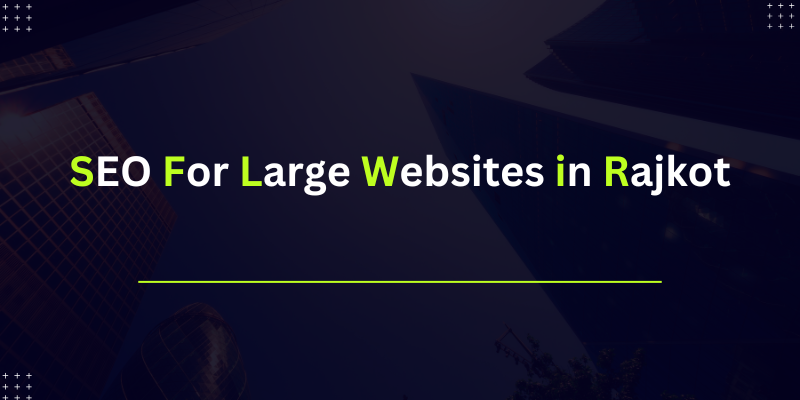SEO for Large Websites

In today’s competitive digital world, SEO for large websites is more important than ever. Whether you’re running an e-commerce platform, a corporate website, or a content-heavy blog, optimizing your site for search engines is crucial for driving organic traffic and achieving your business goals. At JG IT Solution, we specialize in providing expert SEO for large websites, ensuring that your site ranks well on search engines while maintaining optimal user experience and performance.
What Makes SEO for Large Websites Different?
When it comes to SEO for large websites, there are several unique challenges that smaller websites don’t face. Large websites typically contain a vast number of pages, products, or blog posts, which makes it essential to have a strong and organized SEO strategy to manage the site’s complexity effectively. A well-planned SEO for large websites approach helps improve crawlability, enhance keyword targeting, and ensure that the user experience remains seamless, no matter how extensive the content is.
Key Challenges in SEO for Large Websites
- Crawlability and Indexing: Large websites often have hundreds or even thousands of pages. Ensuring that search engines can crawl and index all these pages is essential for SEO. With complex site structures, it becomes even more critical to optimize the site’s internal linking structure and make sure search engines can easily navigate through it.
- Duplicate Content: With so many pages, large websites are prone to duplicate content issues. Duplicate content can hurt your SEO efforts by confusing search engines about which page to rank. Proper canonicalization and content optimization techniques are essential for maintaining the uniqueness of each page and improving SEO for large websites.
- Site Speed and Performance: As the number of pages grows, so does the load time for your website. Search engines like Google prioritize fast-loading websites, and a slow site can significantly impact your SEO rankings. Optimizing images, enabling caching, and streamlining code are just a few techniques used in SEO for large websites to ensure that your site loads quickly.
- Mobile Optimization: With the increasing use of mobile devices, ensuring that large websites are mobile-friendly is no longer optional. Mobile optimization is a key factor in improving SEO rankings, as Google uses mobile-first indexing. For SEO for large websites, this means ensuring that all pages are responsive and provide a seamless experience on smartphones and tablets.
- User Experience (UX): SEO for large websites isn’t just about keyword optimization. A positive user experience is equally important. Your website should be easy to navigate, with clear calls to action and well-organized content. When users have a pleasant experience, they’re more likely to stay longer on your site, reducing bounce rates and improving your rankings.
Best Practices for SEO for Large Websites
To achieve effective SEO for large websites, here are some best practices that can help your site climb the search engine rankings:
- Site Architecture and Internal Linking: A clear, logical site structure is essential for large websites. Implement a well-organized hierarchy with categories and subcategories to help both users and search engines find content easily. Use internal linking to guide users to related content and spread SEO value across your site. This also helps search engines crawl your website more efficiently.
- Optimizing On-Page SEO Elements: Each page on your website should be optimized with targeted keywords, including the focus keyword “SEO for large websites.” Title tags, meta descriptions, headers, and image alt text should all contain relevant keywords that help search engines understand the content of each page.
- Regular Content Updates: Search engines love fresh, high-quality content. Regularly updating your site with new blog posts, product descriptions, or service pages can improve your rankings and keep your site relevant. When implementing SEO for large websites, ensure that your content is both informative and keyword-rich to target your desired audience effectively.
- XML Sitemaps: Large websites benefit from an XML sitemap, which helps search engines discover all of your important pages. By submitting a sitemap to search engines, you ensure that every page on your site gets crawled and indexed, improving your SEO performance.
- Optimize for Featured Snippets: Featured snippets are a great way to gain visibility on search engine results pages (SERPs). When implementing SEO for large websites, focus on creating content that answers common questions in your industry. Use bullet points, numbered lists, and direct answers to increase your chances of appearing in featured snippets.
- Regular SEO Audits: For large websites, ongoing SEO audits are crucial for tracking performance and identifying areas for improvement. At JG IT Solution, we conduct comprehensive SEO audits to ensure that your site is optimized for both users and search engines.
Conclusion
Effective SEO for large websites requires a well-rounded approach that addresses the unique challenges posed by complex site structures and large volumes of content. By optimizing site architecture, implementing best practices, and maintaining high-quality content, you can improve your website’s search engine rankings and drive more organic traffic. At JG IT Solution, we have the expertise and tools to help you navigate the intricacies of SEO for large websites and achieve long-term digital success.
If you’re looking for expert SEO for large websites, contact JG IT Solution today to learn how we can help optimize your website for greater visibility, performance, and success.
Call us today at +91 81412 32527
Email us at info@jgitsolution.com
Visit our website: jgitsolution.com




